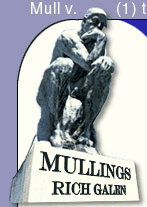

Stresses & Strains
Wednesday December 28, 2005
Click here for an Easy Print Version
From Guadalajara, Mexico
An article in the Washington Post, yesterday, spoke to the issue of post traumatic stress disorder as it affects military personnel returning from Iraq and Afghanistan.
The major issues are: How is it diagnosed? How is it treated? How much (and for how long) should someone affected be on disability?
As I may have mentioned to you previously, I suffered from some level of this syndrome when I got back from Iraq. And that was after spending six months mostly sitting at a desk within the green room inside the palace in the middle of the Green Zone.
The principal manifestation for me was lightning and thunder. For months after I got back I would cringe at lightning in the sky and then clench until the sound of the thunderclap reached me.
I was not having flashbacks to mortar and rocket attacks. I knew I was looking at, and listening to, lightning and thunder. The part that bothered me was that I couldn't stop the automatic reaction to it.
That has faded. A summer storm is now, to paraphrase Freud, just a summer storm.
Another issue was having people stand too close to me. As a native New Yorker, I understand this is largely a genetic issue, but I distinctly remember my hackles rising when I sensed someone, say at a cross walk, standing beyond my peripheral vision on my left or right.
If I have hackles, which I am not at all certain I do.
You know this feeling. It's the same one you get when you think someone is staring at you from behind. The difference is, it probably doesn't occur to you that they might be hiding an AK-47 under their new Jos. A. Banks blazer.
That, too, has largely faded although I still occasionally ask someone standing behind me in line at the Starbucks if they would mind stepping back just a touch.
There is a reason that humans and not saber-toothed tigers are the dominant species on the planet. We are wired to protect ourselves and, even though the fight-or-flight mechanism generally exhibits itself, in 21st century America, in the form of a hand gesture to the driver in the car ahead of you who is READING THE PAPER AND SIPPING HIS COFFEE A GOOD 2.3 NANOSECONDS AFTER THE LIGHT HAS QUITE OBVIOUSLY TURNED GREEN, a few months in a war zone will reconnect the same synapses which protected our forebears from the fore claws of cave bears.
The active-duty military has a well-developed system to keeping an eye on returning service members. Non-commissioned officers are trained to look for warning signs and get help for anyone who displays one or more of them.
I'm not certain about reserve and guard units. My suspicion is that once they return to their civilian jobs they are more-or-less on their own unless they act out at drills or at the next summer camp.
Civilians are put on an airplane somewhere in or near a war zone and sent home. When I left there was some discussion about a physical exam on the way out, but I didn't get one.
Any time civilians with whom I spent time in Iraq get together, the subject will come up. Many still jump a little too high at the sound of a Dempsey Dumpster lid slamming down. Others share the crowding response. Some still glance at overpasses to make certain no one is there with a weapon.
Before Christmas at a gathering of from civilian Iraq hands the subject of driving around things in the road came up. Everyone said they will still swerve to avoid any object - even a plastic Safeway bag.
I know of no civilians who have become disabled because of their psychological reaction to serving in a war zone. But post traumatic stress disorder, unlike what I thought before I came home, is very real.
On the Secret Decoder Ring today: A link to the Washington Post piece, the answer to the "hackles" question, a Mullphoto from the airport here, and a Catchy Caption of the Day (if I can find an Internet connection quickly enough).
--END --
Copyright © 2005 Richard A. Galen
Become a
Paid Mullings Subscriber!
(To join the FREE mailing list or to unsubscribe Click Here)

Current Issue |
Secret Decoder
Ring | Past
Issues | Email
Rich | Rich
Who?
Copyright �2005 Richard
A. Galen | Site design by Campaign
Solutions. |

